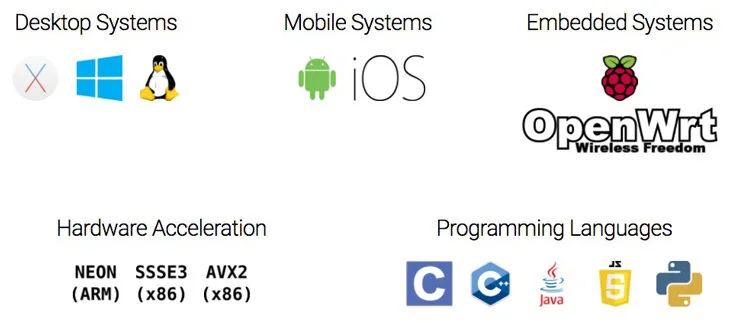
Software Library
Code On licensee Steinwurf has developed a commercial-grade
Random Linear Network Coding (RLNC) software library called Kodo.
Kodo
Kodo provides highly optimized code that can be deployed on most platforms. It is designed to be flexible and extendable to allow for support of new network coding concepts and ideas as they arise. From a user perspective, the library exposes a simple API to allow you to wield the power of network coding in your application.
Source: Steinwurf
Kodo reduces dramatically the time to market for products employing RLNC. It is fully tested on most platforms and is already in use by customers. In addition to its commercial-grade coding functions, it includes a growing library of network protocols.
As it is enhanced and tested by Steinwurf developers, Kodo is continuously benchmarked. Steinwurf’s benchmarking website contains daily records of a number of coding performance metrics such as decoding speed and overhead.
When it comes to sheer coding speeds, Kodo is significantly faster than industry-standard libraries. In a May-2014 measurement campaign, Kodo outperformed state-of-the-art storage libraries, including ISA-L, Jerasure, and OpenFEC.
Code On & Kodo
According to data released by Code On, RLNC performed 13% to 465% faster than the industry standard Reed-Solomon encoding in Storage Area Network (SAN) erasure application testing.
The Kodo library, using RLNC to encode and decode data on a SAN for error correction and fault tolerance, as compared to Intel’s Reed-Solomon library implementation, called ISA-L, and an open-source library implementation called Jerasure. The Kodo/RLNC implementation ran consistently faster on identical SAN hardware.
Data Source: Network World
RLNC Coding Speedup
Speed gains over the fastest competing library varied from 23%-260% for encoding and 13%-90% for decoding. The highest gains were seen at larger block sizes, indicating growing speed enhancements as the industry moves towards larger block sizes.
RLNC’s main selling point is its unique capability to enable next-generation information infrastructure by inherently providing unique features such as multipath transport, seamless distributed storage, and robust streaming. Nevertheless, Steinwurf’s benchmarking results illustrate RLNC’s readiness for deployment as an alternative to existing storage and transport codes.



